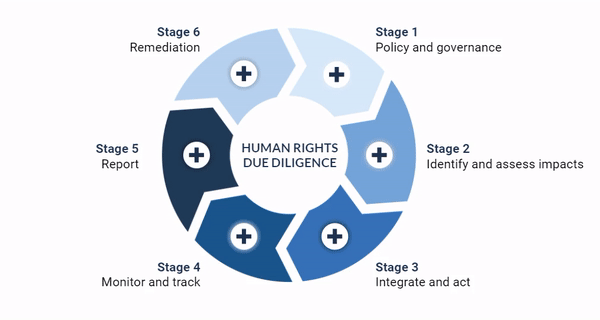New learning tool advances decent work in business
New learning tool advances decent work in business
This 3.5 hour, multi-modular learning plan aims to provide best practices and practical steps to implement the UN Global Compact Labour Principles.
13 January 2023

Despite progress made over the years, decent work deficits around the world remain alarmingly widespread. Advancing decent work across operations and supply chains requires collaborative action and the promotion of sustainable, responsible and inclusive workplace practices, in line with the expectations expressed in the ILO Tripartite Declaration of Principles concerning Multinational Enterprises and Social Policy and the Labour Principles of the UN Global Compact.
In order to support and guide companies in adopting sustainable, responsible and inclusive workplace practices, the UN Global Compact and the International Labour Organization (ILO) jointly developed the new e-learning resource on “Advancing decent work in business through the UN Global Compact Labour Principles”. The course provides a comprehensive introduction to the 4 Labour Principles of the UN Global Compact and the topic of “a safe and health working environment” through an interactive e-learning format, providing concrete guidance and practical advice in line with International Labour Standards (ILS) and experiences gathered through the ILO Helpdesk for Business on ILS.
This new e-learning tool has already been shared with UN Global Compact members and interested parties across the globe. The course is also part of the UN Global Compact Business and Human Rights Accelerator, a six-month programme that will be running for the next three years, supporting companies participating in the UN Global Compact across industries and regions. The Accelerator aims to enhance the setting up effective company level human rights due diligence processes in line with the Universal Declaration of Human Rights and International Labour Standards.
The UN Global Compact and the ILO
Launched in 2000 by former UN Secretary-General Kofi Annan, the UN Global Compact was initiated to invite business worldwide to contribute to the Sustainable Development Goals by committing to the Ten Principles. Four of these Ten principles of the UN Global Compact are Labour Principles, derived from the ILO Declaration on Fundamental Principles and Rights at Work. The Tripartite Declaration of Principles concerning Multinational Enterprises and Social Policy (ILO MNE Declaration) is the only ILO instrument that provides direct guidance to enterprises (multinational and national) on social policy and inclusive, responsible and sustainable workplace practices. The ILO MNE Declaration was developed by representatives of governments, employers, and workers, and is the most comprehensive instrument on decent work and Responsible Business Conduct.
The training plan
This 3.5 hour, multi-modular learning plan aims to provide best practices and practical steps to strengthen business respect for labour standards by embedding and implementing the UN Global Compact Labour Principles.
Promoting respect for labour rights is core to the work of the United Nations Global Compact. With these interactive e-modules we provide concrete and practical guidance to businesses on how to respect and implement the UN Global Compact Labour Principles within all aspects of business operations.
Griet Cattaert
Head of Labour Rights, UN Global Compact
After providing an introduction on the basics of business and decent work, the course presents the Labour Principles of the UN Global Compact, namely freedom of association and the effective recognition of the right to collective bargaining, the elimination of all forms of forced and compulsory labour, the effective abolition of child labour and the elimination of discrimination in respect of employment and occupation. In addition, the training plan also features a dedicated module on a safe and healthy working environment, as it was recently included in the ILO’s framework on Fundamental Principles and Rights at Work.

For each topic covered in the modules, the course provides a basic introduction, overview of relevant legal instruments and international frameworks and concrete steps of what companies can do when applying a due diligence approach. In addition, practical examples from case studies are provided for both small and medium enterprises and multinational enterprises.

Enhanced collaboration for a comprehensive approach
The course is the result of a close collaboration between the UN Global Compact and its Academy, the Multinational Enterprises and Enterprise Engagement Unit (ENT/MULTI) of the ILO and the International Training Centre of the ILO (ITCILO). Consultations with other relevant technical units of the ILO ensured valuable inputs from experts across the organization as well as access to the latest available data on the ILO Fundamental Principles and Rights at Work.
Inter-agency and cross-departmental collaboration within the ILO proved to be a key element to benefit from relevant technical expertise and to ensure a comprehensive approach. In addition, working with the UN Global Compact will ensure greater outreach of the training plan, enabling more people to benefit from this learning opportunity aimed at helping business around the world adopt responsible and inclusive workplace practices.
Githa Roelans
Head, Multinational Enterprises and Enterprise Engagement Unit · International Labour Organization (ILO)

